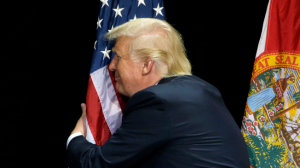The director of Black Panther explaining the details of a fight scene:
Tag Archives | Antiracism
Alt-White Karma
I confess to a certain Schadenfreude about this.
The Invisible East
In the 3rd edition of Classics of Philosophy – which is, ironically, one of the texts I’m using in my “Philosophy East and West” course – Louis Pojman and Lewis Vaughn write:
The first philosophers were Greeks of the sixth century B.C. living on the Ionian coast of the Aegean Sea, in Miletus, Colophon, Samos, and Ephesus. Other people in other cultures had wondered about these questions, but usually religious authority or myth had imposed an answer. … The Great Civilizations of Egypt, China, Assyria, Babylon, Israel, and Persia … had produced art and artifacts and government of advanced sorts, but nowhere, with the possible exception of India, was anything like philosophy or science developed. Ancient India was the closest civilization to produce philosophy, but it was always connected with religion, with the question of salvation or the escape from suffering. Ancient Chinese thought, led by Confucius (551-475 B.C.), had a deep ethical dimension. But no epistemology or formulated logic. (pp. 3-4)
Is this true?
The two earliest Upanishads – the Brihadaranyaka-upanishad and the Chhandogya-upanishad – are generally dated to the 7th century BCE or earlier. They contain clear examples of philosophical argumentation. So why don’t their authors – or the thinkers whose views they purport to record (e.g., Yajñavalka and Uddalaka) – count as Indian philosophers antecedent to the Greeks?
Apparently because their views were “connected with religion” and “the question of salvation.” Yet Classics of Philosophy contains writings by Augustine, Anselm, Maimonides, Aquinas, Pascal, and Kierkegaard – for all of whom philosophy was closely bound up with religious questions. If this connection doesn’t invalidate their claim to be philosophers, why does it invalidate the like claim of their Indian predecessors?
In any case, it is not even true that all early Indian philosophical thought is connected with religion. The Charvaka or Lokayata school, which was atheistic, materialistic, and hedonistic, is generally dated to the late 7th century BCE as well – thus again antedating the Greeks.
As for why the early Chinese thinkers are ruled out as philosophers, we’re told it’s because, although they had a “deep ethical dimension,” they had “no epistemology or formulated logic.” So epistemology and logic are philosophy but ethics is not?
And anyway it’s not true that early Chinese thought had no epistemology or formulated logic. Even if we leave aside the exploration of logical paradoxes by such thinkers as Zhuangzi, Hui Shi, and Gongsun Long, we have a pretty clear example of epistemology and formulated logic in the Mohist Canons.
Of course the Mohist Canons date to around the 3rd century BCE, so if Pojman and Vaughn are making only a claim of chronological priority, they’re entitled to dismiss them. But the tone of the passage certainly offers no hint that these Chinese and Indian traditions got more philosophical later. And the fact that no Indian or Chinese sources appear in an anthology titled Classics of Philosophy (rather than, say, Classics of Western Philosophy) suggests that they don’t regard even later Chinese and Indian thought as containing anything worthy of the status of philosophic classic. The sophisticated logical and epistemological debates among the Navya-Nyaya, Purva-Mimamsa, Vyakarana, and Sautrantika-Yogachara schools, for instance, count for nothing, apparently.
It was bad enough when Antony Flew ignorantly declared in 1971 that Eastern Philosophy contains no arguments, but this is the 21st century, for petesake.
Alt-White Charlottesville
This piece is useful for noting a) the success of private boycotts, direct action, etc., against the Charlottesville racists, as well as b) the shocking revelation that racists are also sexists.
Note also white nationalists’ fondness for the slogan “Blood and Soil.” Who knew?
What’s So Bad About Flag Burning?
[cross-posted at C4SS and BHL]
President-elect Donald Trump’s recent call for a year’s prison term or loss of citizenship for those who burn the American flag – incidentally a reversal of Trump’s previous support for flag-burners on the Letterman show two years ago – leaves me with some questions. Four questions, specifically: two for Trump’s conservative supporters, and two for his liberal critics.

My first question for pro-Trump conservatives is this: In the past I seem to recall hearing quite a few of you (though admittedly not Trump himself) speaking pretty loudly in favor of free expression when the issue was laws in Muslim countries criminalizing speech or writings that “disrespect” Islam or the Prophet Muhammad. How exactly do the arguments you gave then, not apply to Trump’s proposal now?
Second, I also recall that you conservatives used to talk a lot about government’s duty to protect people’s private property rights (although admittedly eminent domain poster boy Donald Trump was never really in your camp on that issue either). Well, if I buy an American flag with my own honestly earned money, or make one with my own cloth and thread, it seems like it’s then my property, the product of my labor; and I don’t see why I shouldn’t have the right to burn my own property, if I do it without endangering anyone else. If the government claims that it, rather than myself, is the one who gets to decide what I do with my flag – that it is, in effect, the real owner of the flag I bought or made – doesn’t that sound more like communism than like a free market?
Next, I have a couple of questions for the liberals who’ve been criticizing Trump’s proposal for its excessive harshness toward flag burners. First: It’s great that you’re calling Trump out on his contempt for freedom of expression; but how many of you were offering similar howls of outrage just over a decade ago when Hillary Clinton was supporting the Flag Protection Act of 2005, which likewise called for one-year prison terms for flag burners?
Finally, a question especially for those liberal critics who say that they support the right to burn the flag but disagree with the flag burner’s message. What exactly is supposed to be wrong with the flag burner’s message?
Even if the flag were legitimately a symbol of freedom, a ban on flag burning would be an odd way to honor the flag – sacrificing the reality of freedom to the mere symbol. But is freedom what the flag really stands for?

It’s now becoming more widely accepted that the Confederate flag, however much its supporters may revere it as an icon of freedom, is inextricably associated with the cause of slavery and white supremacy. But how is the American flag – the symbol of the Federal government – any more defensible?
The Confederate flag flew over slavery for five years. The American flag flew over slavery for nearly a century, and then flew over Jim Crow and similar slavery-like restrictions for another century after that. (And the Federal government didn’t move against Jim Crow until the grassroots civil-rights movement had grown strong enough to be worth co-opting rather than ignoring.) And even today, the American flag flies over a country where blacks are disproportionately likely to be killed or imprisoned by agents of the state.
The same flag flew over the slaughtering of American Indians, the kidnapping of their children, and the theft of their land; and that theft still continues today, as for example in the case of the Dakota Access Pipeline. That flag also flies right now over a land where the state records our phone calls, tells us how we can and cannot medicate ourselves, and maintains a regime of privilege that props up the crony corporate elite at the expense of everyone else.
To be sure, American citizens enjoy a higher degree of freedom than do citizens in many other countries, and it is this fact that leads so many to view the American flag as a symbol of freedom. But such liberty as Americans enjoy was hard-won, in the main, by grassroots efforts that eventually prevailed against government resistance. Honoring the flag, the symbol of the Federal government, doesn’t celebrate our freedoms; it celebrates the central authority from whom those freedoms were heroically wrested.
Around the world, too, troops bearing the Americsn flag have too often propped up dictators and bombed civilian populations, from Asia to Central America to the Middle East. American bombs have killed dozens of civilians in the past several months just in Yemen alone. Is it any wonder that millions of people around the world view the American flag with fear, seeing it not as a symbol of freedom but rather as a harbinger of terror and death? In the face of that reality, defensive insistence that the flag “really” means something else rings as hollow as the neo-Confederate’s claim of “Heritage, Not Hate.”
We’ve begun, as a nation, to relinquish our blinkered reverence for the Confederate flag. It’s high time that reverence for the American flag followed it into equally well deserved oblivion.
Upcoming Panels on International Law and Prison Reform
[cross-posted at BHL and C4SS]
Two panels organised by the Center for a Stateless Society are coming up at two different conferences next week, bringing a left-libertarian market-anarchist perspective to international relations and prison reform.
1. The Molinari Society will be holding its annual Pacific Symposium in conjunction with the Pacific Division of the American Philosophical Association in San Francisco, March 30-April 3, 2016. Here’s the schedule info:
Molinari Society symposium:
Author Meets Critics: Gary Chartier’s Radicalizing Rawls: Global Justice and the Foundations of International Law
G6D. Thursday, 31 March 2016, 6:00-8:00 p.m. (or so), Westin St. Francis 335 Powell St., San Francisco CA, Elizabethan C, 2nd floor.
chair:
Roderick T. Long (Auburn University)critics:
David Reidy (University of Tennessee)
Zooey Sophia Pook (New Mexico State University)author:
Gary Chartier (La Sierra University)
2. We’ve also organised a panel at the Association of Private Enterprise Education conference in Las Vegas, April 3-5, 2016. Here’s the schedule info:
Prisons: Reform or Abolition?
2.G.8. Monday, 4 April 2016, 4:00-5:15 p.m., Bally’s Hotel and Casino, 3645 Las Vegas Blvd. S., Las Vegas NV, room TBA.
chair:
Roderick T. Long (Auburn University)panelists:
Daniel J. D’Amico (Brown University)
Gary Chartier (La Sierra University)
Jason Lee Byas (Georgia State University)
Roderick T. Long (Auburn University)
Another C4SS writer, Billy Christmas, will also be speaking at APEE on “Toward Methodological Anarchism,” on Tuesday, 5 April, in a session at at (horribile dictu) 8:00 a.m.